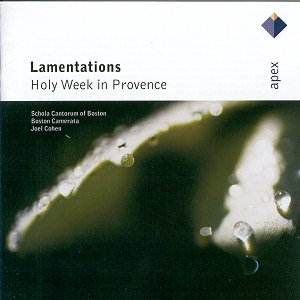"Provence,
Languedoc, and Aquitaine played a greater part in the history
of French music than one might otherwise suppose - not everything
happened at Versailles." With this sentence Philippe Beaussant
opens his liner notes to this recording of sacred music by composers
from the Provence. This CD concentrates on music written for Holy
Week, mainly settings of the Lamentations of Jeremiah, which were
sung on Thursday, Friday and Saturday as part of the Office of
Tenebrae.
Michel
Lambert introduced the Lamentations to France, and other French
composers, like Charpentier, Brossard and François Couperin
followed in his footsteps, even as far as the style of composing
is concerned. Their settings are all for one to three solo voices,
with a small instrumental accompaniment, often basso continuo
only.
On
this CD we find a completely different setting of the First Lamentation
(Première Lamentation) for the three respective days, by
Jean Gilles. It seems these have been composed at the early stages
of Gilles as composer, probably in Aix-en-Provence. Gilles has
composed the texts of the Lamentations, including the Hebrew letters
at the beginning of every section, in the style of the French
‘grand motet’: an alternation of passages for one or more solo
voices and chorus, with an accompaniment of strings and basso
continuo. Philippe Beaussant refers to the fact that musical life
in Provence was influenced by Italy. That is reflected by Gilles’
setting of the Lamentations: orchestral effects and harmony are
used to underline the text (e.g. dissonance on the words ‘plorans
ploravit’ in the First Lamentation).
Another
remarkable composer represented here is Guillaume Bouzignac. His
music was never published, and he was never attached to the royal
court or chapel and as a result his music was soon forgotten.
It was only rediscovered at the beginning of the 20th century.
The American musicologist James Anthony wrote about Bouzignac’s
music: "There is a degree of individuality in his music altogether
remarkable in a period of general conformity within a prescribed
genre. Simply stated, there is no other music of the time that
looks the same on the page or sounds the same as the motets of
Bouzignac." The two items on this recording are both connected
to the Passion of Christ. "Heu! Unus ex vobis" contains
a short scene from the hours before Jesus’ death at the cross.
It is a ‘dialogue motet’ in which the solo voice sings the words
of Jesus and the chorus acts as the disciples at the Last Supper
and Judas and the crowd at the arrest. "Ha! Plange"
is a lament on the crucifixion with the refrain: "Ah! lament,
daughter of Jerusalem; Ah! lament, virgin daughter of Zion".
It is very expressive, highly declamatory piece of music, which
is almost ‘un-French’ in its very drastic illustration of the
text.
There
is one piece from the renaissance: the Passion motet "Vexilla
regis" by Elzéar Genet de Carpentras ("The standards
of the King appear; the mystery of the Cross shines forth in glory").
It is an alternatim setting: the uneven verses are in plainchant,
the even polyphonic.
There
is also a plainchant setting of another text for Passiontide:
"Ne avertas faciem tuam". It is sung in the traditional
Provençale way, with many small ornaments. It shows how
many different forms of plainchant existed before the unification
attempts by the Roman Catholic Church at the beginning of the
20th century.
In
between, Anne Azéma reads some traditional texts in the
language of the Provence - at least, so it seems, since this CD
doesn’t contain the words of the items in this recording, and
the liner notes don’t tell anything about them.
The
booklet is the only problem I have with this CD: there is plenty
information about Gilles, but none at all about Bouzignac or Carpentras.
And the lack of lyrics is a great pity: why are these so often
omitted in reissues? There will be financial reasons, I suppose,
but when will record companies start to realise that lyrics are
indispensable in cases like this?
As
far as the interpretation is concerned: I am very impressed by
the way the music is sung and played. We have a real ensemble
here, where everyone involved follows the same path. The singers
are excellent and blend very well. The instrumentalists are playing
expressively.
As
far as I know there are no other recordings of Gilles’ Lamentations.
The two motets by Bouzignac have been recorded by William Christie
with Les Arts Florissants (Harmonia mundi France), but I prefer
the performances by Cohen. In particular the performance of the
motet "Heu! Unus ex vobis" is much more convincing here:
in Christie’s recording it sounds like a piece of Russian Orthodox
music, with a solo part which is too pathetic. I am surprised,
though, that here the Italian pronunciation of Latin is used.
I can’t figure out why.
But
that hasn’t spoilt my enjoyment. I strongly recommend this recording.
Johan
van Veen

